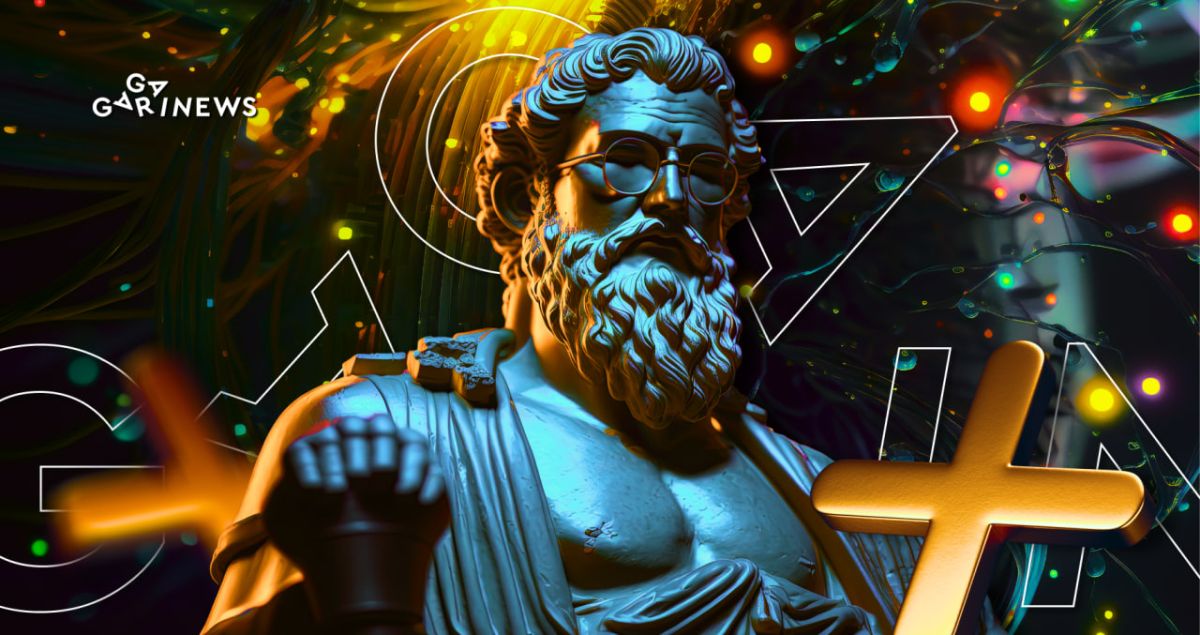Religion and Blockchain: Can They Merge?

The idea of merging religion and blockchain may seem outlandish or surreal at first. Surprisingly though, there are several instances where blockchain technologies or cryptocurrencies have been embraced by religious groups or even became the bedrock for establishing new faiths.
On this page
Uniting religion with technology (not forgetting that blockchain is also a cutting-edge innovation) isn't a novel or unique concept. Since the medieval era, technology has been a tool for religion, bearing both positive and negative implications. For example, every religion has been influenced by technological advancements such as the invention of the printing press. This allowed for the creation and distribution of religious texts, holy scriptures, and books. Over time, it was the church-operated printing presses that first began publishing non-religious books, giving rise to the genre of fiction literature. However, technology's negative influence was also palpable – technological progress equipped the Inquisition with increasingly advanced instruments and devices for the persecution of heretics.
With the advent of the internet, religious forums, online communities, websites for religious groups, and even religious social networks were brought to life. These platforms provided participants with a means to not only exchange ideas but also share digital content.
After the emergence of Bitcoin and decentralized ledgers, known as blockchains, religions once again felt the touch of technology. For instance, the Church of Bitcoin is a religious organization aiming to utilize blockchain technology to broaden its geographically distributed congregation and increase anonymous donations from worshippers worldwide. Certain churches have begun actively utilizing cryptocurrencies as a means for collecting donations or for paying for church services.
Let's delve into some of the most prominent cases of churches or religions that have directly incorporated blockchain technologies and cryptocurrencies.
The Church of Bitcoin
Back in 2017, enthusiasts of Bitcoin decided to found their own spiritual gathering – the Church of Bitcoin. These disciples of the earliest cryptocurrency aimed to free the world from the iron grip of government bodies and central banks. They felt those entities were restricting the free flow of cryptocurrencies and reducing civil liberties.
Believers in this church even have their own prophet – the elusive creator of Bitcoin, known only by the pseudonym Satoshi Nakamoto, a figure whose true identity continues to be shrouded in mystery.
These churchgoers maintain that everyone should possess the freedom to exchange or trade without the overreach of any governing body or third party. They have faith that Bitcoin is the key to achieving this liberty. They view the technical document penned by their prophet, Satoshi Nakamoto, as something of a sacred scripture, and are committed to adhering to its philosophy of open-source code and the free sharing of information.
This belief that Bitcoin could be seen as the religion of the 21st century is also shared by journalist Lorcan Roche Kelly of Bloomberg.
According to Kelly, beyond the prophet, the church has its own sacred scripture – Bitcoin's whitepaper, authored by its creator. This document offers a detailed vision of a society of free individuals, underpinned by the technology of decentralized digital money and distributed ledgers. The faith also boasts its own saints and apostles, people who have communicated or collaborated directly with the creator of Bitcoin, such as the late Hal Finney (revered as the “holiest”), who was the first to receive a Bitcoin transaction, among others.
Yet, the lack of new publications on the church's blog since February 2022 seems to suggest a dwindling interest in this spiritual venture.
The Church of Bitcoin welcomes all. Source: churchofbitcoin.org
Religious Blockchain Platform 0xΩ
In 2018, Matt Liston, the former head of the blockchain platform Augur, founded a blockchain-based religion named “0xΩ”. It didn't quite qualify as a religion per se but rather seemed more like a tool to accompany other religions. Therefore, a more accurate label for “0xΩ” would be a “religious blockchain platform”. Its concept revolves around the idea that blockchain technology can democratize all congregants' rights without needing any form of superior centralized church leadership. In this way, all power is delegated to the believers, and there's no single center for making church and religious decisions. The 0xΩ platform is based on the Ethereum blockchain and uses smart contracts to automate religious practices and rituals. This approach ensures transparency and decentralization and allows all interested believers to participate in religious events, regardless of borders and geographic location.
The 0xΩ platform does not prescribe any canons or postulates—everyone believes in what they want and does so in their own way, regardless of their faith. Any denomination is invited to move their holy scriptures onto the blockchain and actively participate in developing their religious doctrine.
Thanks to the use of blockchain technology and principles of decentralization, believers can vote and collectively approve changes in their religion's canonical documents, collectively determine various spiritual guides and leaders, accumulate and control monetary inflows, and direct these resources toward the needs of the church and its parishioners.
Companies Digitizing Churches and Religious Movements
The popularity of the “blockchain church” concept has reached such a scale that companies have emerged that are ready to assist religious communities in establishing churches of a new, digital nature. For instance, the Digital Church Network (DCN), motivated by the slogan “A Church is not just a building,” offers a complete solution for creating new churches and religious movements.
They propose a wide array of formats, from SMM (attracting congregations via social media) to creating comprehensive digital or Metaverse churches. DCN provides education, mentoring, and all-around support. The preparation of digital pastors will also not be a problem, as the team comprises pastors of various specialties, each overseeing specific areas and ready to share their experiences.
At present, it might be hard to visualize attending a Metaverse church for a virtual liturgy with the use of a virtual reality headset and an avatar. However, it seems this format could become a reality in the not-too-distant future.
The idea of forming a church in the Metaverse is no longer surprising in our time… Source: digitalchurch.network
Criticism Towards Blockchain Churches and Other Blockchain-Based Religions
Organizations like the Church of Bitcoin and others of a similar nature have come under criticism from religious communities and the general public. Critics of new technologies argue that these religions lack the historical and cultural significance of traditional ones and merely serve as marketing strategies to promote cryptocurrencies and blockchain technologies. Furthermore, some critics maintain that the Church of Bitcoin and similar religious organizations do not qualify as genuine religious movements or denominations because they lack faith in a higher or supernatural power.
Conclusion
The emergence of blockchain-based religions prompts many questions regarding the future of these movements and their connection to technology. While proponents claim that these organizations represent a new form of spiritual assembly, critics perceive them as a threat to traditional religions and their cultural and spiritual importance.
It remains to be seen whether these types of religions will gain widespread recognition in the future and whether they will have the capacity to influence or significantly displace traditional religious customs.
The content on The Coinomist is for informational purposes only and should not be interpreted as financial advice. While we strive to provide accurate and up-to-date information, we do not guarantee the accuracy, completeness, or reliability of any content. Neither we accept liability for any errors or omissions in the information provided or for any financial losses incurred as a result of relying on this information. Actions based on this content are at your own risk. Always do your own research and consult a professional. See our Terms, Privacy Policy, and Disclaimers for more details.



























